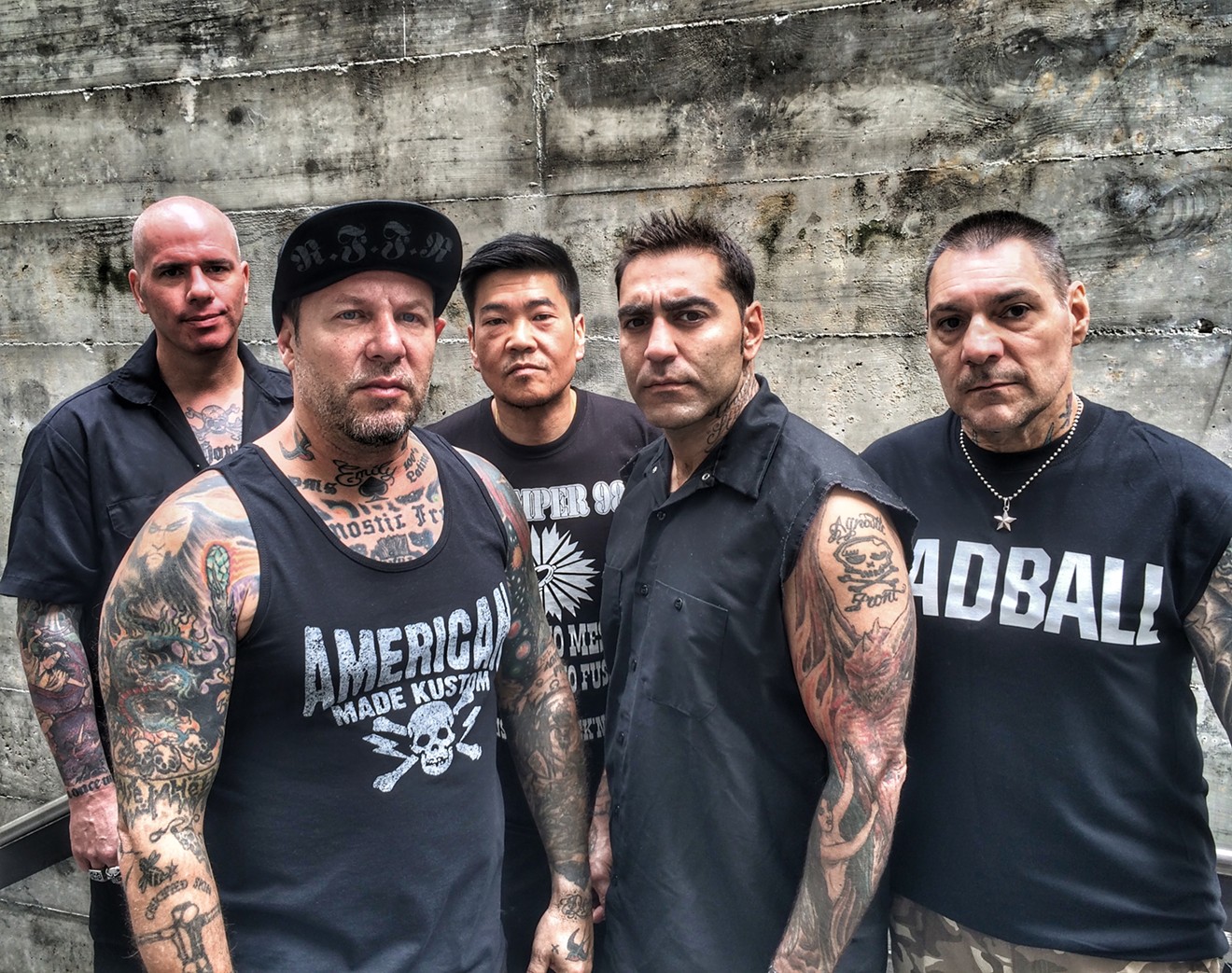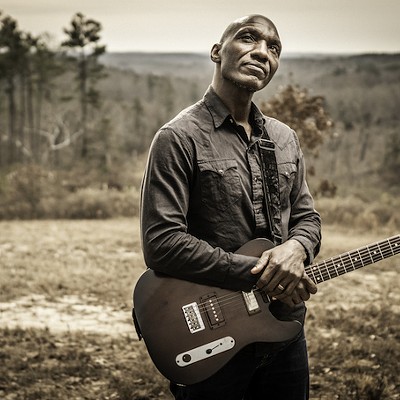Support Us
Houston's independent source of
local news and culture
account
- Welcome,
Insider - Login
- My Account
- My Newsletters
- Contribute
- Contact Us
- Sign out
Anti-Religion, Anti-Society, Anti-Conformity: The Saga of Agnostic Front singer Roger Miret
David Ensminger May 21, 2019 5:00AM

Agnostic Front Remain on the Forefront of American Hardcore
Photo by W. Craig
[
{
"name": "Related Stories / Support Us Combo",
"component": "11591218",
"insertPoint": "4",
"requiredCountToDisplay": "4"
},{
"name": "Air - Billboard - Inline Content",
"component": "11591214",
"insertPoint": "2/3",
"requiredCountToDisplay": "7"
},{
"name": "R1 - Beta - Mobile Only",
"component": "12287027",
"insertPoint": "8",
"requiredCountToDisplay": "8"
},{
"name": "Air - MediumRectangle - Inline Content - Mobile Display Size 2",
"component": "11591215",
"insertPoint": "12",
"requiredCountToDisplay": "12"
},{
"name": "Air - MediumRectangle - Inline Content - Mobile Display Size 2",
"component": "11591215",
"insertPoint": "4th",
"startingPoint": "16",
"requiredCountToDisplay": "12"
}
,{
"name": "RevContent - In Article",
"component": "12527128",
"insertPoint": "3/5",
"requiredCountToDisplay": "5"
}
]
New York City hardcore punk is indeed a breed like no other and was born from the gritty streets in the tension-filled early 1980s. It rose to life in places like the embattled Lower East Side and the territory of clubs like notorious CBGB and lesser known, but equally vital ones, like A7, Two Plus Two Annex, and more.
Agnostic Front, appearing with Prong and Obituary at Warehouse Live on May 25, was by no means the first hardcore band to emerge full-throated, severe, and aggressive from that terrain, since Bad Brains, the Mob, the Stimulators and more brandish that honor. Yet, Agnostic Front forged a long-term reputation, and feverish, sinewy musical output, that navigated the underground male psyche in a tough time.
Punks, hardcore fans, and skins were considered miscreants and losers — the unwanted, lowlifes, and the vilified. But charging through the tumult was singer Roger Miret (who also fronts Roger Miret and the Disasters), who despite being awash in drugs back then, was always focused on a sense of brotherhood. Indeed, he is a half-brother to Madball’s singer Freddy Cricien. With laser-like focus over the subsequent years, his lyrics have concentrated on survival, pride, and honor in the hazardous streets formerly thick with drug dealers, gangland members, the homeless, and hell-raisers.
Today, as Miret knows, New York City is more like a postcard of safe passage and progressive politics; from 1978-1985, though, dope dealers shadowed people down dirty sidewalks, people pissed in the streets surrounded by burned-out buildings, and parks eventually glinted with crack pipes. It embodied a reckless dystopia.
After throwing his raw talent as a self-taught bassist into bands like Distorted Youth (from his youthful forays in New Jersey) and the Psychos (from his earliest days in the Manhattan), Miret started helming Agnostic Front, who were breakneck fast, like an ear-splitting machine gun. Together with guitar marauder Vinnie Stigma, the band also became as steely-nerved as a pouncing animal. Gigging at venues like A7 in 1983, Miret didn’t even bother occupying the stage. In the slam-pit, he roared — a fiery piston with a scorched throat — amongst flailing arms and legs.
From then on, his stage manner was all electric whir – he bounced, pounced, and glided as if a fleet-footed boxer.
Their debut album Victim in Pain became a boilerplate hardcore how-to guide: every NYC hardcore band in its wake seemed to borrow something from the template: nostril-flared attitude, percussive walls of sound, and down-tuned guitars. The songs clocked in at two minutes, brimmed with anti-religious, anti-normal society, and anti-conformity messages. Agnostic Front abhorred fascism too and appealed for underground youth culture to join hands, though some fans completely misread the message.
“Victim in Pain, for instance, if anything, was more about social politics as opposed to world politics,” explained Miret over the phone. “It was mostly about what was going around me on a day-to-day-basis, right? Today it’s a little bit different. Today, we have technology that goes a long way. There’s a lot of stuff we did back then in 1980/81 that would never fly today.”
As a Spanish-speaking Cuban immigrant in the tumult and flash points of the city, Miret was strident as a true believer. Hell-bent on protecting his punk flock from the hazards of life, he acted as mediator between street toughs and the often white’n’pasty, skinny, tattered, and bluntly cropped-hair punk crowds. And as crowds teemed at CBGB, the band tried to keep to its philosophy: “I wanted a band to speak of social unrest, political aspects to it … there’s still a lot things going on in the world. I wanted more than just a name of a band, I wanted statement of some kind,” Stigma told a filmmaker on camera in 1985. And the band nailed it.
Of course, though standard bearers, Agnostic Front were not loners. Many, like the Abused, Urban Waste, and Sick Of it All joined them in the heady period of the 1980s to cement hardcore punk as an alternative soundtrack to both the noise scene and the remaining no-wave scene that garnered so much praise from critics. Hardcore kids raged in the shadows, in the tumbledown squats, the crap-strewn clubs, the hovels and seedy parks, the greasy pizza corners, and the feisty bodegas.
Meanwhile, Cro-Mags teemed with eastern religious zeal, and Cause for Alarm, with their hardcore skater edge, captured much attention and followers, but Agnostic Front have sustained their fan base, and their output, for intense decades.
Much misunderstood and misrepresented, they remain polarizing. In the early fanzine nation days, Maximum Rocknroll, which reached thousands of disparate kids through its informal DIY networks, criticized them. Like Miret, editor Tim Yohannan was raised in New Jersey. So, the tussle seemed even more edgy. Yet, more recent writers for Maximum Rocknroll, like Bruce Roehers, championed and interviewed them, since he believed Victim of Pain remained one of the most significant records to capture the fury and manner of hardcore.
At the time, Agnostic Front conveyed shock value. Now, they convey continuity. “Just even think about simple things, for example, like the Sex Pistols. If the Sex Pistols were a band today, they would be over by tomorrow,” Miret exclaims. “It was just a different time and different place, and what was a shock value to people is clearly not a shock value to people, or to anyone today, and it shouldn’t be.”
At times, Agnostic Front were shunned as brutal, fisticuff skinheads who played blunt, minimal music; yet, their second record Cause for Alarm cascaded with musical growth and metal-leanings. Soon they paired at gigs with the likes of Voivod and Slayer, Motorhead and Death Angel – not exactly street punk, at all. Then again, by the 1990s, the band more directly embraced street punk on portions of albums like Riot, Riot Upstart before returning to their muscular hardcore biography on My Life My Way.
And Miret’s obsession with survival and violence should surprise no one: his family were victims of domestic abuse, his immigrant parents were employed at filthy, foul, and hazardous chicken plants, and his brother almost died during a playful scuffle that went badly wrong. Only a neighbor’s quick thinking and homemade bandages kept him alive; meanwhile, Miret's family ate pigeon soup to fill their stomachs.
Hence, Miret has always been the survivor, and aggression was the guide to his survival even during hours spent at home, where he defended himself from ransacking neighbors in streets most of us would avoid at any length.
At school, he was an outsider: during games he wanted to be the villain, and he doubted organized religion. So, though disco from Chic to Donna Summer, then classic rock like Led Zeppelin, delivered him some momentary peace from beatings and chaos, punk rock (thanks to his cousin Chuchi) became his family, his refuge, his modus operandi, his coping mechanism.
In essence, punk rock saved him. All of this was documented at length in his memoir My Riot: Agnostic Front, Grit, Guts and Glory (Lesser Gods Books), which left few stones left unturned. And Miret does acknowledge the different pressures and possibilities defining the eras, especially the current 21st century epoch brimming with social media hazards and endless Internet searches.
“It’s a different way of sensitive-ness, a different way of life. It worked then, but it would not work today. And I am pretty honest and clear about that. This had its place and had its time. [Today] we have much more access to a lot more knowledge, so we can learn a lot more,” he told me adamantly.
“At the same time, such access has also created a lot of division and stuff like that. I like to take the best out of the worst, though, and put my own feeling and things together. Of course, I recognize when something is completely out of [whack]… like no way. But it’s just different times, man.”
And the very fact that Miret remains on the cusp of it all, leading his band into the murk of yet another decade end, attests to his spiky endurance, test-hardened spirit, and untrammeled drive.
Agnostic Front are scheduled to open for Prong and Obituary, May 25, 7 p.m., Warehouse Live, 813 Emmanuel. For more information, call 713-225-5483 or visit: https://www.warehouselive.com/. $25 advance, $28 day of show, plus fees.
KEEP THE HOUSTON PRESS FREE...
Since we started the Houston Press, it has been defined as the free, independent voice of Houston, and we'd like to keep it that way. With local media under siege, it's more important than ever for us to rally support behind funding our local journalism. You can help by participating in our "I Support" program, allowing us to keep offering readers access to our incisive coverage of local news, food and culture with no paywalls.
David Ensminger
Trending Music
- Houston Concert Watch 5/8: Nicki Minaj, Kenny Chesney and More
- Top 10 Butt-Rock Bands of All Time
- Nothing But Hill Country Love From Cedric Burnside
-
Sponsored Content From: [%sponsoredBy%]
[%title%]

Don't Miss Out
SIGN UP for the latest
Music
news, free stuff and more!
Become a member to support the independent voice of Houston
and help keep the future of the Houston Press FREE
Use of this website constitutes acceptance of our
terms of use,
our cookies policy, and our
privacy policy
The Houston Press may earn a portion of sales from products & services purchased through links on our site from our
affiliate partners.
©2024
Houston Press, LP. All rights reserved.




